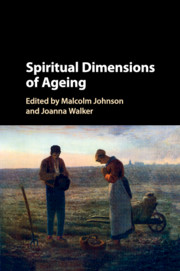Book contents
- Frontmatter
- Contents
- List of Contributors
- Preface
- Acknowledgements
- 1 Spirited Ageing
- Part I The Spiritual Journey of Ageing
- Part II Cultures of the Spirit in Modernity
- Part III Searching for Meaning in Later Life
- Part IV Meeting Spiritual Needs in Older Age
- 14 Conversation Matters
- 15 Spiritual Development in Later Life: A Learning Experience?
- 16 Reimagining the Theology of Old Age
- 17 Pressing towards the Finishing Line: Supporting Older People on Their Final Lap
- Index
- References
14 - Conversation Matters
from Part IV - Meeting Spiritual Needs in Older Age
Published online by Cambridge University Press: 22 December 2016
- Frontmatter
- Contents
- List of Contributors
- Preface
- Acknowledgements
- 1 Spirited Ageing
- Part I The Spiritual Journey of Ageing
- Part II Cultures of the Spirit in Modernity
- Part III Searching for Meaning in Later Life
- Part IV Meeting Spiritual Needs in Older Age
- 14 Conversation Matters
- 15 Spiritual Development in Later Life: A Learning Experience?
- 16 Reimagining the Theology of Old Age
- 17 Pressing towards the Finishing Line: Supporting Older People on Their Final Lap
- Index
- References
Summary
Introduction
Research evidence supporting the positive contribution of spirituality to wellbeing in later life is now extensive. Likewise, the negative impact of loneliness on later life has been demonstrated by numerous research programmes. The clarity of such findings suggests that the issue is no longer that of unearthing more and more evidence, but rather identifying ways that such insights can be promoted and people encouraged to adopt the beneficial habits that counter loneliness and foster wellbeing. But more than this, the challenge is to enable such change to happen on a large scale.
The research evidence about what makes for a good and healthy old age is exemplified in the paradigm of ‘active ageing’. The World Health Organisation defines active ageing as ‘the process of optimising opportunities for health, participation and security in order to enhance quality of life’ (2002, p. 6). This increasing emphasis on active ageing by policy makers arises because it provides an additional and positive response to the challenge of ageing populations. Instead of perpetuating anxiety by focusing solely on how to meet the immense and complex care needs of a rapidly increasing older population, active ageing provides an additional strategy. If people can be coaxed and coached into adopting the habits that make for a healthy old age, then not only do people maximise their chances of being active and healthy for longer, they are likely to make fewer demands on social and health care.
In Britain, a government 2010 White Paper (for discussion of policy prior to legislation), Healthy Lives, Healthy People, aimed to give momentum to a strategy for healthy ageing. This was followed by 2012 being designated the ‘Year of Active Ageing’ throughout the European Union. These steps seem puny in the face of the challenge to get people to review their lifestyle and undo years, if not decades, of less than healthy living. Furthermore, such change in behaviour has to be achieved on a massive scale. Both energy and imagination will be essential if healthy ageing is to be anything other than a pipedream.
- Type
- Chapter
- Information
- Spiritual Dimensions of Ageing , pp. 235 - 248Publisher: Cambridge University PressPrint publication year: 2016



